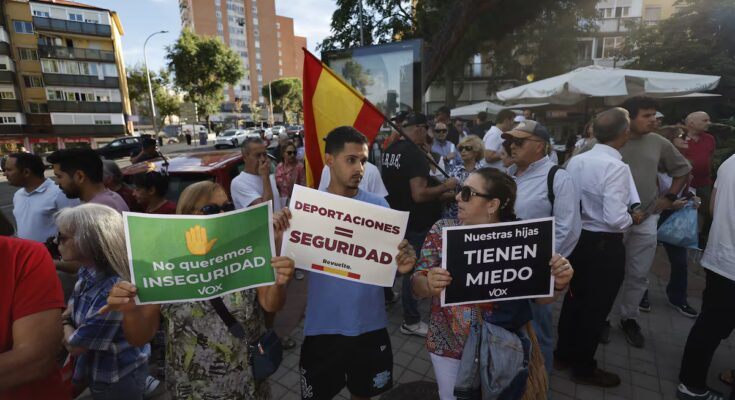Vox’s proposal to lower the penal age of minors from 14 to 12 and to tighten the conditions of imprisonment and discipline in internment centers failed to move forward, receiving 178 votes against to 33 in favor and the PP abstaining. On Tuesday, the Plenary Session of Congress heard strong words such as “vomit”, “disgusting”, “hatred” and “racism”, given that the reform of the law on juvenile criminal responsibility proposed by the far right proposes the immediate expulsion from Spain of children of foreign origin who commit a crime, after having stripped them of their nationality, if they had it, and regardless of the fact that such expulsion takes them away from their parents without the possibility of return for up to six years, even more than what is proposed for adults who do not commit crimes.
Moving on to one of its favorite policies, immigration, Vox is now calling for “drastic decisions” to solve the “social problem” that in its opinion is affecting Spain: “The moral and social deterioration from which society suffers is evident, with devastating consequences for the safety of Spaniards”, assures the party in the motivation read to Congress by MP Blanca Armario. And they attribute it to “clandestine, massive and uncontrolled immigration”, as well as to the “sought hypersexualisation of minors in education” by the left. The PP, through Fernando de Rosa Torner, had to remember that even juvenile offenders belong to wealthy families, but in his strategy of swimming without getting his clothes wet, the popular MP accepted the low crime figures indicated by Vox and harshly criticized the government’s policy to finally suggest: “Wouldn’t you like us to listen to the experts before proposing this reform?” And abstain.
The representative of Esquerra Republicana, Pilar Valluguera, gave the example of a boy who shot himself in the foot with a weapon “that he couldn’t have had at 13”, referring to Felipe Juan Froilán, the king’s nephew, which happened in 2012. Not all boys who play with weapons belong to “broken” families or are committed by “foreign minors”, as Vox points out. On many occasions it is precisely the opposite, these are victims of trafficking for the purpose of sexual or labor exploitation, as the police well know, who in recent days announced the dismantling of one of these networks.
But the accusation against them was so evident in Vox’s argument that several parliamentarians accused “hatred” and “racism” that they hide behind a reform they did not want to support. All those who spoke reproached the far right for its recurrent and “sick” political discourse against migrant children, in the words of Àgueda Micó, of the Mixto group, just as they all appealed to education and prevention as tools to reduce crime at these ages. This is what they did with the interventions of the Basque group, Podemos, Sumar and the socialists. Raúl Díaz Marín gave voice to the latter: “You use hatred and heavy-handedness, cruelty and institutionalized racism, and we will not tolerate it. You treat minors like things,” said the deputy, who concluded with the phrase: “How easy it is to be a fascist in a free country, but how difficult it is to be free in a fascist country.”
A few minutes earlier, the Vox representative had underlined that “Spain has become an amusement park for criminals” and that “crime suits” the left-wing parties, because “they feel at ease among criminals”. The deputy did not hesitate to accuse left-wing parties of “perverting” children and warned that “the party will not be paid for those who come to kill, rape girls and women, exploit the security forces and trample on the lives of Spaniards.” To those he says “out”, he pronounced it with many exclamation points. Vox demands that “the entire judicial sanctioning apparatus of the State” falls on them. MP Micó recalled that Spain has one of the lowest youth crime rates in Europe.
The ultra party proposes to lower the penal age and statistics show that the older the children, the higher the crime rate increases, with 17 years the highest, with 7.1 minors convicted per 1,000 inhabitants in 2024, according to the INE. The majority of those convicted are of Spanish nationality (80%), however the rate per 1,000 inhabitants of children between 14 and 17 years old is borne by foreigners, almost double the number of convictions compared to those of Spaniards. Injuries and robberies are however the most repeated crimes and the offenses are concentrated in Melilla and Ceuta with around 62% of cases, the Canary Islands, Extremadura and Aragon (which are close to 19%). The Community of Madrid is the one with the lowest rate, with 6.6.



